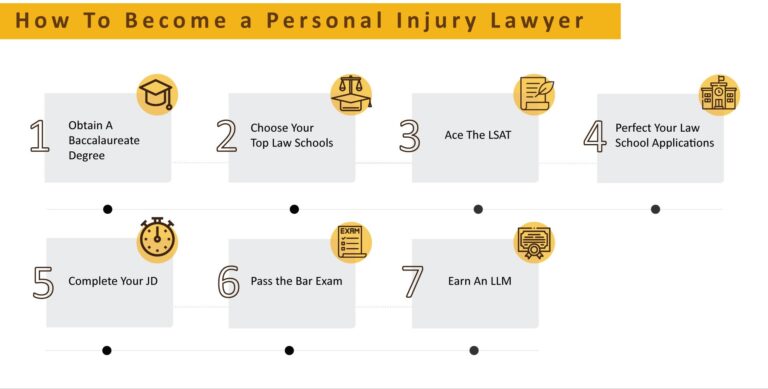Can a Paralegal Become a Lawyer?

A paralegal can become a lawyer through further education and passing the bar exam. Becoming a lawyer is an achievable goal for paralegals who wish to advance their careers.
By obtaining the necessary education and passing the bar exam, paralegals can transition into practicing law. While paralegals already have a solid foundation in legal knowledge and experience, becoming a lawyer requires further study in law school to gain in-depth legal expertise.
Table of Contents
After completing law school and successfully passing the bar exam, paralegals can gain the necessary credentials to practice law independently. This transition allows paralegals to utilize their existing skills and experience while taking on a more significant role in the legal profession.
Educational Requirements For Becoming A Lawyer
Becoming a lawyer requires a solid educational foundation and a commitment to rigorous study. To embark on the journey from paralegal to lawyer, individuals must meet certain educational requirements, which include obtaining an undergraduate degree, attending law school, and passing the bar exam.

Undergraduate Degree
Before entering law school, aspiring lawyers must obtain an undergraduate degree. While there is no specific major required, it is advisable to choose a program that incorporates critical thinking, analytical skills, research capabilities, and effective communication.
Some popular undergraduate majors for pre-law students include but are not limited to:
- Political Science
- Criminal Justice
- History
- English
- Economics
- Philosophy
These programs cultivate skills that are essential for success in law school and the legal profession. Additionally, it is crucial to maintain a high GPA during undergraduate studies, as strong academic performance can enhance the chances of admission to a reputable law school.
Law School
After completing an undergraduate degree, aspiring lawyers must enroll in and successfully complete law school. A Juris Doctor (J.D.) degree is required to practice law in most countries. Law school typically spans three years of full-time study, during which students focus on the complexities of the legal system, legal research, writing, and practical skills training.
During law school, students have the opportunity to specialize in specific areas of law by selecting elective courses or participating in legal clinics. These experiences prepare them for the real-world challenges and intricacies they will face as practicing attorneys.
Passing The Bar Exam
Upon graduation from law school, aspiring lawyers must pass the bar exam in the jurisdiction they wish to practice. The bar exam is a comprehensive assessment of legal knowledge, typically consisting of multiple sections covering various areas of law.
The specifics of the bar exam may vary from jurisdiction to jurisdiction, but it generally tests candidates’ understanding of both substantive and procedural law. It is a high-stakes examination that determines an individual’s eligibility to become a licensed attorney and practice law independently.
Preparation for the bar exam requires countless hours of study and practice. Many aspiring lawyers enroll in bar exam review courses, which provide comprehensive materials, guidance, and practice exams to maximize their chances of success.
Earning a passing score on the bar exam is a significant milestone in the journey from paralegal to lawyer. It signals the attainment of the necessary legal knowledge and competence to represent clients and advocate for justice in the court of law.
Transitioning From Paralegal To Lawyer
Transitioning from paralegal to lawyer is a possibility for those looking to advance their legal career through further education and licensure. With the necessary qualifications, a paralegal can successfully become a lawyer and take on the responsibilities and opportunities that come with it.
Transitioning from a paralegal to a lawyer is an exciting and rewarding career move. As a paralegal, you have valuable experience working in the legal field, which can provide a strong foundation for your journey towards becoming a lawyer. This article will guide you through the key steps involved in making this transition, including gaining experience as a paralegal, applying to law school, and choosing a specialization. By following these steps, you can transform your paralegal experience into a successful legal career.
Gaining Experience As A Paralegal
To successfully transition from being a paralegal to a lawyer, it is crucial to gain as much experience as possible in your paralegal role. This experience not only enhances your understanding of the legal profession but also provides valuable insights into the practical aspects of law.
Here are some ways you can gain experience as a paralegal:
- Work in different areas of law: By working in diverse practice areas, you can familiarize yourself with various legal issues and develop a broader knowledge base.
- Take on challenging assignments: Seek out opportunities to work on complex cases or projects that require in-depth research and analysis. This helps you develop critical thinking skills and attention to detail.
- Build relationships with attorneys: Networking with attorneys in your firm or through professional associations can open doors to new opportunities. It allows you to learn from experienced lawyers and gain insights into their career paths.

Applying To Law School
Once you have gained substantial experience as a paralegal, the next step is to apply to law school. While each law school has specific admission requirements, there are general steps you can follow to increase your chances of acceptance.
Consider the following tips when applying to law school:
- Research law schools: Explore different law schools to find the ones that align with your career goals and interests. Look into their rankings, specializations, and faculty to make an informed decision.
- Prepare for the LSAT: The Law School Admission Test (LSAT) is a crucial component of the application process. Dedicate time to study and prepare for this exam to achieve a competitive score.
- Craft a compelling personal statement: Your personal statement is an opportunity to showcase your passion for the law and articulate why you want to become a lawyer. Make it engaging and highlight your unique experiences as a paralegal.
- Obtain strong recommendation letters: Request recommendation letters from attorneys or supervisors who can attest to your skills, work ethic, and potential as a law student and future lawyer.
Choosing A Specialization
After gaining admission to law school, you will have the opportunity to choose a specialization that aligns with your interests and career goals. Specializing in a specific area of law can give you an advantage in the job market and allow you to focus on the cases and clients that resonate with you.
Consider the following factors when choosing a specialization:
| Factors to Consider | Benefits |
|---|---|
| Personal interest | Working in a field you are passionate about can increase job satisfaction and motivation. |
| Job market demand | Research the job market to identify areas of law that are in high demand, ensuring better career prospects. |
| Skills and aptitudes | Assess your strengths and weaknesses to determine which practice areas align with your natural abilities. |
By carefully considering these factors, you can choose a specialization that not only complements your paralegal experience but also aligns with your long-term career aspirations.
Challenges And Advantages Of Transitioning
Transitioning from a paralegal to a lawyer presents both challenges and advantages. Notably, paralegals possess a solid foundation of legal knowledge and practical experience, making the transition smoother. However, additional education, passing the bar exam, and gaining courtroom experience are essential hurdles to overcome.
Can a Paralegal Become a Lawyer?
Transitioning from a paralegal to a lawyer comes with its own set of challenges and advantages. While it is not an easy journey, the rewards can be tremendous. Let’s delve into the specific challenges and advantages that paralegals face when making the transition.
Overcoming Educational Differences
One of the main challenges that paralegals face when becoming a lawyer is overcoming the educational differences. While paralegal education may provide a solid foundation of legal knowledge, it may not be as comprehensive or in-depth as a law degree. However, with determination and hard work, paralegals can bridge this gap and acquire the necessary qualifications to become a lawyer.
To overcome these educational differences, paralegals aspiring to become lawyers may need to pursue further education, such as enrolling in law school or completing a part-time law degree program. This additional education allows them to gain a deeper understanding of the law and prepare for the rigorous demands of legal practice.
Building A Legal Network
Building a legal network is crucial for paralegals who want to transition to a career as a lawyer. While working as a paralegal, they have the opportunity to establish connections with attorneys, judges, and other legal professionals. These relationships can be invaluable when it comes to gaining insight into the legal profession and securing mentorship.
A strong legal network can also provide paralegals-turned-lawyers with potential job opportunities. Through their connections, they may learn about job openings, internships, or even receive referrals from trusted colleagues. By leveraging their existing relationships, paralegals can significantly enhance their chances of success as they navigate the path towards becoming a lawyer.
Applying Practical Knowledge
One significant advantage that paralegals have when transitioning to becoming a lawyer is their practical knowledge. Through their experience as paralegals, they have likely gained hands-on exposure to various aspects of legal practice. This practical knowledge can be a valuable asset when they step into the role of a lawyer.
Paralegals who become lawyers can apply their practical knowledge in a real-world context, offering them a unique perspective. This firsthand experience allows them to understand the intricacies of legal processes, client management, and case preparation. Their ability to apply this practical knowledge sets them apart and enables them to provide efficient and effective legal services to client.
In conclusion, transitioning from a paralegal to a lawyer may present challenges related to educational differences, building a legal network, and acquiring a deeper understanding of the law. However, paralegals can leverage their practical knowledge and establish connections within the legal community to successfully navigate this transition. With dedication and the right resources, paralegals can transform their careers and become accomplished lawyers.

Financial Considerations
If you are considering a career transition from a paralegal to a lawyer, it is important to take into account the financial considerations involved. Pursuing a legal education can be a significant investment of time and money, and it is crucial to understand the costs, potential debt, and salary expectations before making this decision.
Cost Of Law School
Attending law school can have a substantial impact on your finances. Tuition fees, along with additional expenses such as textbooks, housing, and transportation, can vary depending on the program and location. On average, law school tuition fees in the United States range from $25,000 to $50,000 per year. However, elite law schools can have tuition fees of up to $60,000 or more annually.
Student Loans And Debt
Taking out student loans to finance your legal education is a common practice, but it is crucial to carefully consider the implications. Before committing to law school, research scholarship and grant options that can help offset costs. While loans can provide necessary financial aid, they also result in student debt that needs to be repaid after graduation. Create a realistic budget and evaluate your ability to repay these loans. Being mindful of managing your debt can help ensure financial stability in the long run.
Salary Expectations
One of the main considerations when contemplating a transition from paralegal to lawyer is the potential increase in salary. Lawyers typically earn higher salaries compared to paralegals due to their additional education and responsibilities. The average annual salary for lawyers in the United States is around $126,930. However, it is important to note that salaries can vary depending on factors such as location, specialization, and experience. Research and understanding salary trends in your desired area of practice will give you a realistic view of the financial benefits of becoming a lawyer.
Alternate Careers For Paralegals
Are you a paralegal looking to explore alternative career options in the legal field? There are several paths you can take to further your career and expand your expertise. In this blog post, we will discuss some compelling options for paralegals seeking new opportunities. Below are three alternate career paths that paralegals can pursue:
Legal Consultant
If you have accumulated years of experience as a paralegal and have a strong understanding of legal processes and regulations, a career as a legal consultant could be an exciting option for you. As a legal consultant, you can provide expert advice and guidance to clients on legal matters. Whether you choose to work independently or as part of a consulting firm, your role would entail offering insights, conducting legal research, and assisting clients in making informed decisions related to their legal issues.
Legal Analyst
A career as a legal analyst could be a fulfilling choice, especially if you have exceptional analytical skills and enjoy researching and interpreting complex legal information. As a legal analyst, you would be responsible for analyzing legal documents, statutes, and case precedents. Your insights and findings would be utilized by attorneys to develop legal strategies, prepare for trials, and support their arguments in court. A strong attention to detail and the ability to effectively communicate your analysis are vital skills for this role.
Compliance Officer
Another career path worth considering is becoming a compliance officer. In this role, you would be responsible for ensuring that organizations abide by relevant laws, regulations, and ethical standards. Your expertise as a paralegal can contribute greatly to this field, as you would have a deep understanding of compliance requirements and legal frameworks. As a compliance officer, you would monitor and assess the organization’s operations, develop compliance protocols, and conduct regular audits to identify risks and implement corrective measures.
By exploring these alternate career paths, paralegals can diversify their skill set, broaden their legal knowledge, and pursue exciting opportunities in the legal field.
Conclusion
The path from paralegal to lawyer is not an easy one, but it is indeed possible. With the right combination of experience, education, and determination, paralegals can make the transition and become successful attorneys. By leveraging their existing knowledge and skills, paralegals have a unique advantage in understanding the inner workings of the legal profession.
So, if you’re a paralegal considering a career change, don’t let anyone tell you it’s impossible – with hard work and dedication, you can turn your dreams into reality.
Introducing Jonah Plum, a legal luminary whose journey through the corridors of justice has been intertwined with the eloquence of the written word. Born and raised in the vibrant city of Seattle, Washington, Jonah's early fascination with language and debate laid the foundation for a remarkable career in law.
Jonah's scholarly odyssey began at Harvard Law School, where they immersed themselves in the study of jurisprudence, honing their analytical prowess and legal acumen. Armed with a law degree, they entered the legal arena, navigating courtrooms and boardrooms with a fervor for justice. Yet, it was the realization of the transformative power of the written word that led Jonah to pivot from legal briefs to the world of blogging.
A digital advocate in the truest sense, Jonah recognized the need for demystifying legal concepts and making them accessible to a broader audience. This blog, a virtual repository of legal insights, transcends geographical boundaries, connecting with a global readership hungry for clarity amidst legal complexities.
Beyond the black letter of the law, Jonah delves into the human stories that underscore the legal landscape. Their writing goes beyond legal analysis, weaving narratives that humanize the law, shedding light on its impact on individuals and society.






